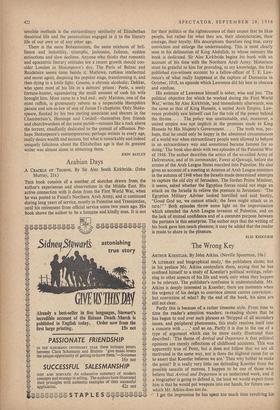The Wrong Key
ARTHUR KOESTLER. By John Atkins. (Neville Spearman, 16s.) 'A LITERARY and biographical study,' the publishers claim; but in his preface Mr. Atkins contradicts them, saying that he has confined himself to a study of Koestler's political writings, refer- ring to other aspects of his life and work only when they happen to be relevant. The publisher's confusion is understandable. Mr. Atkins is deeply interested in Koestler; there are moments when the urgency of his design to convince almost carries conviction : but conviction of what? By the end of the book, his aims are still not clear.
Partly this is because of a rather tiresome style. From time to time the reader's attention wanders; re-reading shows that he has begun to nod over such phrases as 'Stripped of all secondary issues, and peripheral phenomena, this study resolves itself into a concern with . . .' and so on. Partly it is due to the use of a type of argument which can be more easily illustrated than described : 'The theme of Arrival and Departure is that political opinions are merely reflections of childhood accidents. This was apparently true of Peter, but it does not follow that we are all motivated in the same way, nor is there the slightest cause for us to assert that Koestler believes we are.' Then why bother to make the point? It is really very little use defending Koestler from the possible assaults of morons. I happen to be one of those who believe that Arrival and Departure is an underrated work, and if a biographer is going to defend it, the least we would expect from him is that he would put weapons into our hands, for future use— which Mr. Atkins does not do.
I get the impression he has spent too much time revolving his ideas in his own mind, instead of thrashing them out with people who, perhaps, feel differently on the subject. He actually boasts about his detachment from the current literary arena; how detached can be gauged from the assertion that out of 'personal snobbery' he does not 'rush to the library to hunt Mr. Ralph Straus's latest recommendation.' As Ralph Straus died some six years ago, this suggests not so much personal snobbery as Rip Van Winklery. The result is, Mr. Atkins is so immersed in his personal abstractions that the book's only merit is its urgency. It recalls one of those dreams in which we have the illusion that we have the key, at last, to the secrets of the Universe: in sleep a king; but, waking, no such matter.
BRIAN INOLIS



































 Previous page
Previous page